Join a beautiful revolution
Welcome to We Can Fix It, where we face the climate crisis with facts, feelings, and action. Written by me, climate scientist Kim Nicholas.
Hi friends,
Back to school vibes! The students arrive this week, and I start teaching my new course, Climate Science and Politics, next week. It’s a rocket start after a beautiful summer. Installing the electric motor (and 90kg of batteries) on our 50-year-old sailboat was WAY more work than I expected. But we figured it out! It works great! And Simon and I loved living on the boat for 10 days, circumnavigating the Öresund. Building up to that dream of the Atlantic crossing one step at a time…
This month, I have some Good Climate News for you! Plus, making room for the sadness (and All the Climate Feels), and encouragement to join a beautiful revolution near you.
Facts: Countries legally responsible for climate harmDid you catch this huge piece of good climate news over the summer?
A landmark, unanimous advisory opinion by the International Court of Justice found states are legally obligated to cut climate pollution, and may be held legally liable if they fail to do so.
This was a HUGE victory for the campaign started in 2019 by 27 law students from Pacific Island countries. 👏👏👏 Amazing work! 👏👏👏
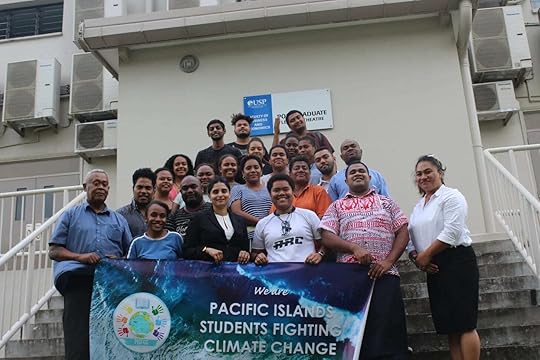 The team at Pacific Island Students Fighting Climate Change, whose 2019 campaign led to the International Court of Justice decision in July 2025. BRAVO!! Yay science!
The team at Pacific Island Students Fighting Climate Change, whose 2019 campaign led to the International Court of Justice decision in July 2025. BRAVO!! Yay science! The court built heavily on science, especially the reports from the Big Bad Mothership of Climate Facts, or the Intergovernmental Panel on Climate Change (IPCC) (refresher on who they are). As Carbon Brief reported, judges in the case also arranged a meeting with IPCC scientists.
Thank you, scientists, for writing and compiling scientific papers, and for the flood of written and oral statements that were submitted to the court to inform their opinion!
2 big findings from the legal opinion 1. States have “binding obligations to ensure the protection of the climate system”The courts found “states have a duty to prevent significant harm to the environment”, requiring them to act with “due diligence” and use “all means at their disposal” to prevent climate harm. As Carbon Brief reported,
The court sets out the “appropriate measures” that would demonstrate due diligence, including “regulatory mechanisms…designed to achieve deep, rapid and sustained reductions” in emissions. This repeats language from the IPCC, but attaches it to countries’ legal obligations.
I love to see an IPCC quote I use on my slides in teaching show up in court! But that’s not all…
2. If states harm the climate or environment, they can be held accountableIf states do cause significant climate harm, from too-weak international climate pledges or national regulations, the court says it’s feasible to hold specific states responsible for climate damages on a case-by-case basis.
“Failure of a State to take appropriate action to protect the climate system from greenhouse gas emissions — including through fossil fuel production, fossil fuel consumption, the granting of fossil fuel exploration licences or the provision of fossil fuel subsidies — may constitute an internationally wrongful act which is attributable to that State.”
-International Court of Justice, July 2025
Got that?? States may be held liable for their excessive fossil fuel production, consumption, and subsidies!!
A court might order a country to make a climate pledge in line with its Paris obligations, or allow nations and “injured individuals” to seek “reparations” for climate damage.
The takeawayMega-polluting countries have long feared having to pay for the harms their climate pollution has caused. This opinion is a powerful new tool to hold governments accountable. I’m excited to see where it will lead!
Feelings: “Make room for the sadness”My family in Sonoma, California evacuated from wildfire in 2017. I was afraid we’d have to in 2020, when I was home on an emergency visit when my hospitalized father got Covid in that scary first summer of the pandemic.
Thankfully my family was safe. But since I experienced the shattering disorientation of a grey sky and an orange sun, I don’t take blue-sky summers for granted.
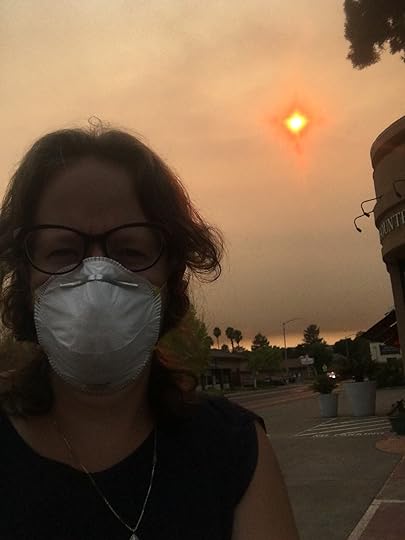 Me + smoky skies in my hometown of Sonoma, California in August 2020.
Me + smoky skies in my hometown of Sonoma, California in August 2020. As more and more of us experience the terror and grief of warming-worsened wildfires, this post from the wise Dr. Elizabeth Sawin stopped me in my tracks. With her permission, I’m sharing it with you:
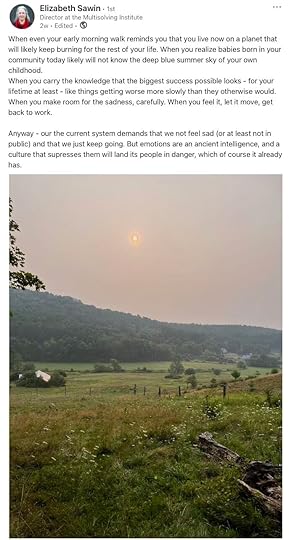 Source: LinkedIn post by Elizabeth Sawin, shared with permission.
Source: LinkedIn post by Elizabeth Sawin, shared with permission. I’m grateful for people like Beth who are naming and making space for All the Climate Feels. It’s good to know we are walking this tough path in company, don’t you think?
Action: Join a Beautiful RevolutionLast weekend, I joined hundreds of people singing, dancing, knitting, sharing poetry and children’s books, speaking, sitting, sleeping, marching, and peacefully demonstrating for a safe climate together, through rain and shine.
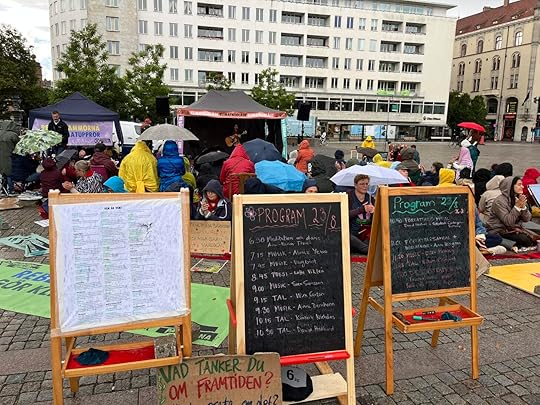 A packed, fun program for the Mother’s Rebellion 24-hour climate protest in Malmö, Sweden. Members sit in a circle facing the public, inviting connection.
A packed, fun program for the Mother’s Rebellion 24-hour climate protest in Malmö, Sweden. Members sit in a circle facing the public, inviting connection. The Rebellmammorna (Rebel Mammas) led 24 beautiful hours of climate action in a busy central square in Malmö, Sweden.
It was a delight to be part of. As soon as I showed up, I was offered a cookie!
Grandmas were sitting in cozy armchairs, knitting away (part of the Knitting for Climate movement).
I gave a talk thanking the demonstrators for being out on the streets, and why it makes a difference:
My first climate protestIf you’ve never been to a climate protest before, I get it. It feels like a big step to take. I was in your shoes, as I wrote about in Under the Sky We Make, pondering joining my first protest in 2014:
Protests work!
“I’m a scientist, not an activist,” I thought to myself. I had never been to a protest or marched in the streets for anything, and it sounded a bit . . . weird? Silly? Vulnerable?
Then I read an article that changed my mind. (I’ve looked for it and can’t find it, so that author will never know they inspired me!) Basically, it said, what if this was the thing that made the difference? There’s no way to know beforehand, and you’ll probably never know afterward either, but what if this is the start of the tipping point? “Okay,” I thought. “I’ll go.”
I sat at my kitchen table with a piece of poster board and colorful markers and pondered what to put on my sign. I ended up making a footnoted protest sign summarizing the science, with references: It’s warming. It’s us. We’re sure. It’s bad. We can fix it.
Now it’s your turn. Climate demonstrations are fun and energizing, they build joy and community, and they work.
If you’re among the lucky 12% of people globally who live in a liberal democracy, according to the Varieties of Democracies Project, then your most powerful climate superpower is your actions as a citizen. And peaceful protests are among your most effective citizen actions.
Peaceful protests have been shown to increase climate support, including favorable shifts in climate media coverage and public opinion. One study found increased climate protests were associated with declines in emissions in US states. Plus, joining demonstrations is a great way to meet people with the same goals as you.
How to get involvedYour high-impact action this month is to find a local group you can join and support in climate demonstrations.It's most effective to start with an existing organization. There is one near you that would love your support!
Find the next meeting of your group, put it in your calendar, and show up! Bonus points if you bring a friend.
Your talents are needed – whether it's designing materials, building coalitions, showing up for the big day of action, updating websites, providing childcare, accounting... movements need it all!
A great place to start, with tons of chapters globally and lots of great resources for becoming a more savvy activist, is 350.org.
Actions in September 2025350.org is co-organizing a week of action during the United Nations General Assembly, where world leaders gather in New York City.
Their Draw the Line campaign demands an equitable and just transition to phase out fossil fuels, build renewables, and shift to sustainable food.
You can find a local action for Draw the Line in cities like New York, Edmonton, Vancouver, Berlin, London, Paris, Wellington, Melbourne, Belém, Johannesburg, Dhaka, Tokyo, and more… or get support to organize your own.
In Sweden, there are climate demonstrations being organized in Stockholm for September 9 (when parliament re-opens), and Gothenburg on September 13 (one year before our next national election).
Join one of these actions, or find one near you!
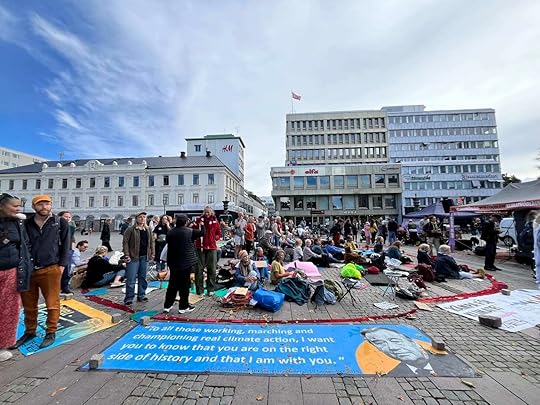 UN Secretary-General António Guterres says we’re on the right side of history and he’s with us! Photo: meParting Tidbits Upcoming talks, come see me here
UN Secretary-General António Guterres says we’re on the right side of history and he’s with us! Photo: meParting Tidbits Upcoming talks, come see me hereWednesday, September 17, 10am Pacific/1pm Eastern/19h Sweden: Drawdown Ignite webinar: Individual Climate Action with Impact: Five Climate Superpowers to SHIFT the System. I’m VERY excited to share the launch of The Super High-Impact Initiative for Fixing Tomorrow (SHIFT). I’ve been working on this for four years, and in the last year collaborating with an amazing team at Project Drawdown who has brought it to life beyond my dreams. Right here is the first public announcement — join us for the guide that helps people understand their power, and then prioritize climate actions that punch above their weight.
Friday, September 26, 13:15-17:00, Lund, Sweden: Celebrating 25 years with LUCSUS. Come hear about the past, present, and future of sustainability science research and teaching. I’ll moderate the panel, and I promise it will be lively!
Book RecommendationThe Serviceberry: Abundance and Reciprocity in the Natural World, by Robin Wall Kimmerer. This short book, more like an extended essay, is a quiet and lovely meditation on the world that’s possible if we can learn to live in peace with nature. Kimmerer writes about embracing reciprocity as a way of “keeping nature’s gifts in motion,” taking care of the gift so it can keep on giving. “Recognizing ‘enoughness’ is a radical act in an economy that is always urging us to consume more.” You can see my highlights on Goodreads.
Thanks for reading!
xo,
Kim
P.S. I’d love to hear your climate dilemmas and triumphs, please feel free to send me a voice note!
This post is free to make climate action accessible to everyone. Please subscribe to receive new posts. If you find my work valuable and are financially able, I am grateful for any support you can give as a paid subscriber.



